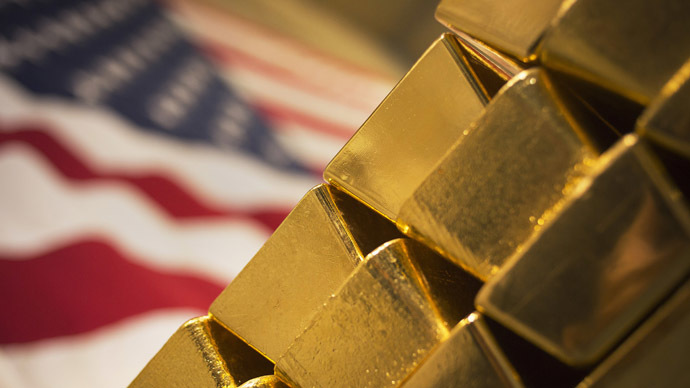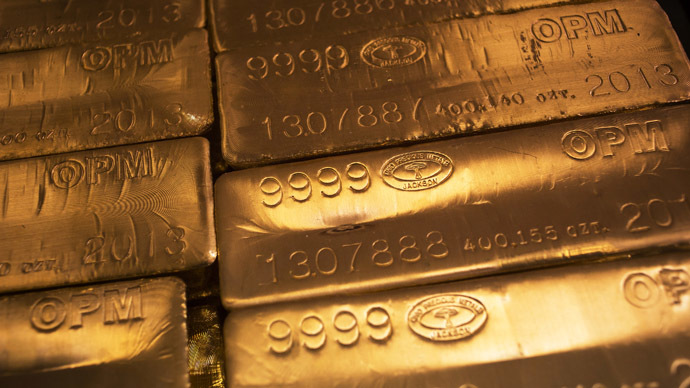China, gold prices & US default threats

In the very days when a deep split in the US Congress threatened a US government debt default, the gold price should normally jump through the roof, yet the opposite was the case. It is worth a closer look why.
Since August 1971, when US
President Richard Nixon unilaterally tore up the Bretton Woods
Treaty of 1944 and told the world that the Federal Reserve
‘gold window’ was permanently closed, Wall Street banks
and US and City of London financial powers have done everything
imaginable to prevent gold from again becoming the basis of trust
in a currency.
On Friday, October 11, when there was no sign of any deal between US Congress members and the Obama White House that would end the government shutdown, the Chicago CME Group, which operates Comex - the Chicago Commodity Exchange, where contracts in gold derivatives are traded - announced that at 8:42am Eastern time the trading was halted for 10 seconds after a safety mechanism was triggered because a 2-million-ounce (56.7 million grams) gold futures sell order was executed.
Something rotten in gold market
The result of that huge paper gold sale was that at just the time when a possible US government debt default would send investors in a panic rush to the safety of buying gold, instead, the price plunged $30 an ounce to a three-month low of $1,259.60 an ounce. Market insiders believe the reason was direct market manipulation.
David Govett, head of precious metals at bullion broker Marex Spectron, calls the sudden huge futures sale suspicious.
"These moves are becoming more and more prevalent and to my mind have to either be the work of someone attempting to manipulate the market or someone who really shouldn’t be trusted with the sums of money they are throwing around. There are ways of entering and exiting a market so that minimum damage is caused and whoever is entering these orders has no intention of doing that," Govett said.
UBS gold trader Art Cashin echoed the suspicion.
“…if that happens once it could be an accident of technology, or it could be a simple error. But when it happens five times over a period of months, it does raise questions. Is it being done purposefully? Is somebody trying to influence the market?”
That ‘someone’ market sources believe is the Obama White House, in league with the Federal Reserve and key Wall Street banks that would be ruined were gold to really rise.
In March 1988, five months after the worst one-day stock market plunge in history, President Ronald Reagan signed Executive Order 12631. Order 12631 created the Working Group on Financial Markets, known on Wall Street as the ‘Plunge Protection Team’ because its job was to prevent any future unexpected financial market panic selloff or ‘plunge’.
The group is headed by the US Treasury Secretary and includes the chairman of the Federal Reserve, the head of the Securities & Exchange Commission, and the head of the Commodity Futures Trading Commission (CFTC) which is responsible for monitoring derivatives trading on exchanges.
Numerous times since 1988, reports have surfaced of secret
interventions by the Plunge Protection Team to prevent a market
panic selloff that could threaten the role of the US dollar.
Former Clinton White House staff chief George Stephanopoulos
admitted in 2006 that it was used to support the markets in the
1998 Russia/LTCM crisis under Bill Clinton, and again after the
9/11 terrorist attacks in 2001.

He said, "They have an informal agreement among major banks to come in and start to buy stock if there appears to be a problem."
Clearly stocks are not the only thing the government manipulates. Gold these days is a prime focus. The price of gold in recent years—since the eruption of the US dot.com IT stock bubble in 2000—has exploded from around $300 an ounce to a recent record high above $1,900 in August, 2011. Gold rose an impressive 70 percent from December 2008 to June 2011, after the Lehman Brothers collapse and the start of the Greek crisis in the eurozone.
Since then, with no clear reason, gold has reversed and lost more than 31 percent, despite the fact that talk of a unilateral Israeli military strike on Iran and the US financial debacle combined with a euro crisis, and now, threat of US government default, created overall huge demand for investment in gold.
This past April 10, the heads of the five largest US banks, the Wall Street ‘Gods of Money’ — JPMorgan Chase, Goldman Sachs, Bank of America and Citigroup — requested a closed door meeting with Obama at the White House. Fifteen days later, on April 25, the largest one-day fall in history in gold took place. Later investigation of trading records at Comex revealed that one bank, JP Morgan Securities, was behind the huge selloff of gold derivatives. Derivatives are pieces of paper or bets on future gold or other commodity prices. To buy gold futures is very inexpensive compared with gold but influence the real physical gold price, largely because the US Congress, under lobby influence from Wall Street, since 2000 and the Commodity Trading Modernization Act, has left gold derivatives unregulated. The President’s Plunge Protection Team was at work now as well, clearly.
China smiles & buys
In effect a war, a financial war, is underway between the Wall Street giant banks and their close allies, including the major City of London banks and banks like Deutsche Bank on the one side, using paper gold derivatives trading in the unregulated COMEX, with covert support of the US Treasury and Fed. On the other side are real investors and Central Banks who believe that the world financial system, especially the dollar system, is teetering on the brink of disaster and that physical gold is the historical best safe haven in such a crisis.
Here, the recent buying of gold reserves by several central banks including Russia, Turkey and especially China, are notable. The short-term derivative gold price manipulations by JP Morgan and Goldman Sachs are creating smiles at the Peoples’ Bank of China and the Russian Central Bank among other buyers of physical gold. Since 2006 Russia’s central bank has increased its gold reserves by 300 percent.
Now, the Chinese central bank has just revealed data showing that China imported 131 gross tons of gold in the month of August, a 146 percent increase compared to a year prior. August was the second highest gold importing month in its history. More impressively, China has imported more than 2,000 tons of gold in the past two years. According to a 2011 cable made public by WikiLeaks, the Peoples’ Bank of China is quietly seeking to make the renminbi (the yuan) the new gold-backed reserve currency.
Hmmmm.
According to unofficial calculations, the Peoples’ Bank of China
today holds about 3,500 tons of monetary gold, surpassing
Germany, to make it number two in the world after the Federal
Reserve.

And there are grave doubts whether the Federal Reserve actually holds the 8,044 tons of gold it claims it does. The former International Monetary Fund director, France’s Dominique Straus-Kahn, demanded an independent audit of the Federal Reserve gold after the US refused to deliver to the IMF 191 tons of gold agreed to under the IMF Articles of Agreement signed by the Executive Board in April 1978 to back Special Drawing Rights issuance. Immediately before he could rush back to Paris, he was hit by a bizarre hotel sex scandal and abruptly forced to resign. Straus-Kahn had been shown a secret Russian intelligence report prepared for President Vladimir Putin in which ‘rogue’ CIA agents revealed that the US Federal Reserve had no gold reserves and only lied that it did.
The stakes for Washington and Wall Street in depressing the gold price are staggering. Were gold to soar to $10,000 or more, where many believe current demand-supply pressures would find it, there would be a panic selloff of the dollar and of US Treasury bonds. China now holds a record $3.7 trillion of foreign currency reserves and the US Treasury bonds and bills are about half that.
That selloff would send US interest rates sky-high, forcing a chain-reaction of corporate and personal bankruptcies that have been avoided since the financial crisis broke in 2007 only owing to record near-zero Federal Reserve interest rates. That selloff, in turn, would be the end of the US as the world’s sole superpower. Little wonder the Obama Administration is manipulating gold. It cannot last very long at this pace, however.
The statements, views and opinions expressed in this column are solely those of the author and do not necessarily represent those of RT.
The statements, views and opinions expressed in this column are solely those of the author and do not necessarily represent those of RT.













